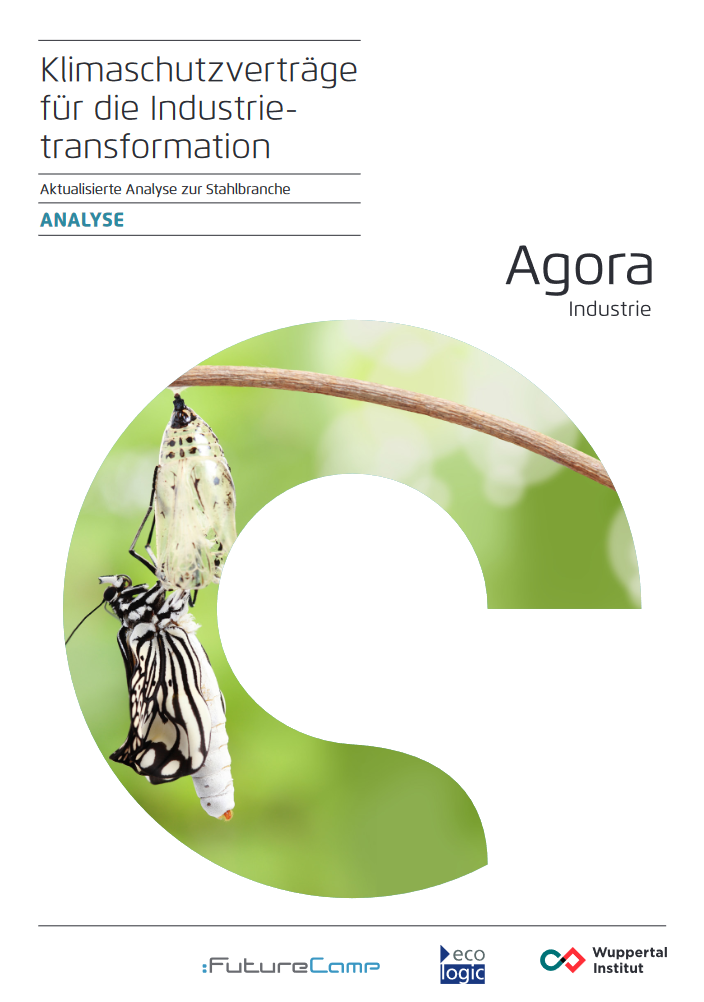Klimaschutzverträge für die Industrietransformation
Kurzfristige Schritte auf dem Pfad zur Klimaneutralität der deutschen Grundstoffindustrie
- Publication
- Citation
Agora Industrie, FutureCamp, Wuppertal Institut und Ecologic Institut (2021): Klimaschutzverträge für die Industrietransformation: Kurzfristige Schritte auf dem Pfad zur Klimaneutralität der deutschen Grundstoffindustrie
Carbon Contracts for Difference are necessary to accelerate investments into climate-friendly production methods
Basic industries – steel, cement and chemicals – need to transform rapidly so as to remain competitive in a world that is headed towards climate neutrality. To achieve the climate targets defined for the sector, any new investment of the steel, cement and chemical industries must be compatible with the path to climate neutrality. The necessary technologies exist, but they remain more expensive and carry a higher risk than conventional alternatives. With Carbon Contracts for Difference (CCfDs), the regulator carries some of this risk and the additional costs as long as green production methods remain costlier and riskier. This report by Agora Industry, FutureCamp and the Ecologic Institute takes a deeper look at Carbon Contracts for Difference – how they work, what their function should be, and how they can best be aligned with other policy instruments such as emissions trading.
The most important findings
- A quick kick-start of industrial transformation with CCfDs is central to securing competitiveness and employment in basic industries. CCfDs enable investments in the transformation towards climate neutrality in 2045.
- By 2030, Germany's greenhouse gas emissions must be 65 percent below 1990 levels. By then, industry alone must reduce its emissions by 68 million tonnes of CO2 annually. With the help of CCfDs, emissions in the steel, chemical and cement industries alone can be reduced by more than 20 million tonnes of CO2 per year before the end of this decade.
- CCfDs are a public instrument that directly supports investment into climate-friendly installations. Depending on how other instruments evolve, the cost for Germany could range from 10 to 43 billion euros – e.g. with a reform of EU emissions trading system and other public guarantees, the need for government subsidies decreases substantially.
- 10-year climate protection contracts between the state and companies create the basis for a supply of basic materials produced in a climate-friendly way, such as green steel, cement and ammonia. This is a prerequisite for green lead markets to emerge, in which climate-friendly basic materials command a premium price.
- The supported investments into climate-friendly production plants can serve as an anchor for the infrastructure development that is needed for a climate-neutral economy – including renewable energies, green hydrogen and Carbon Capture, Utilisation & Storage (CCUS) where needed.
- CCfDs must be integrated with other parts of the policy. They are a transitional tool that should lead into a market-based system. Reforms of other policies should enable climate-friendly products to become the new market standard – including reform of the EU ETS and the measures to protect against carbon leakage, as well as the development of green lead markets (including through public procurement).
To take account of the changes, we have revised our analysis on the role of climate protection contracts in the steel industry, which was mainly based on data from 2020.
